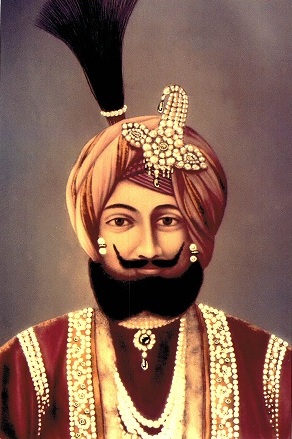| |
Welcome To Maharaja Gulab Singh Memorial Trust
|
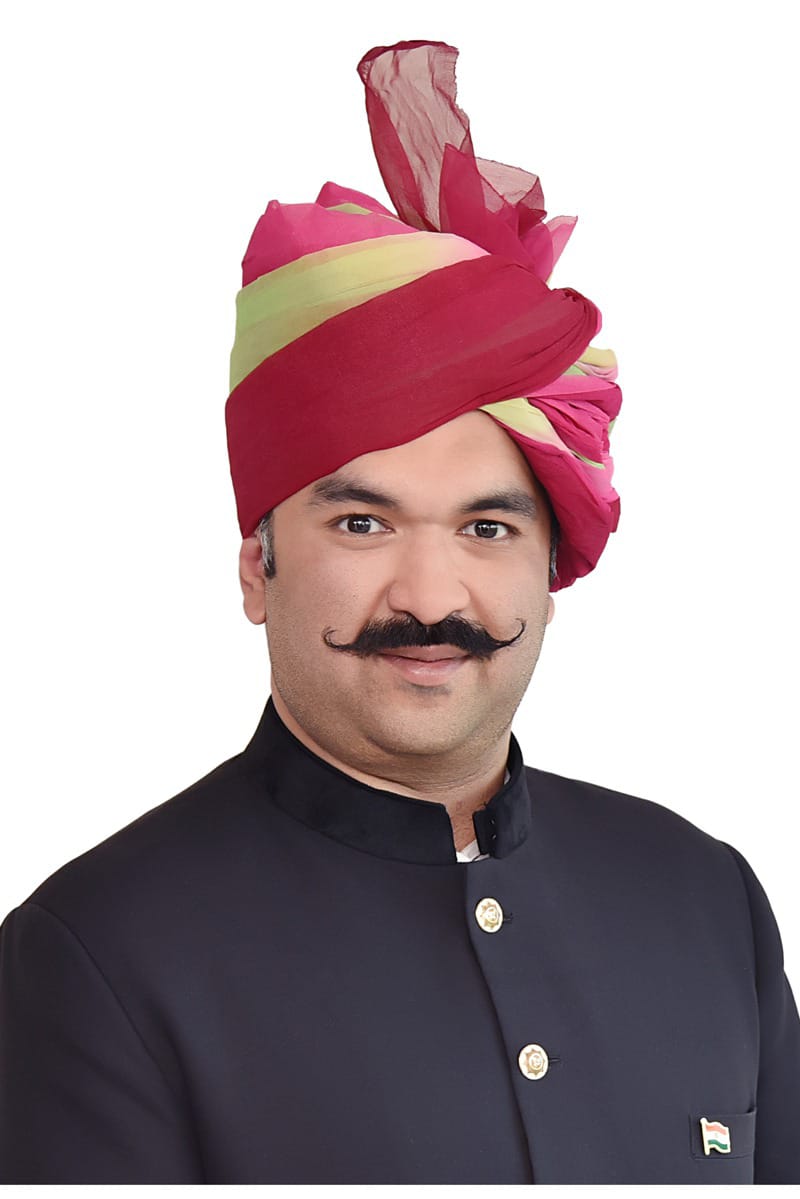
Birthday wishes to Rajkumar Ranvijay Singh ji
On the occasion of your birthday, the staff of the Maharaja Gulab Singh Memorial Trust and Research Centre conveys its sincere greetings and heartfelt best wishes to you.
We take this opportunity to express our deep appreciation for your valuable guidance, steadfast support, and commitment to the ideals and objectives of the Trust. Your leadership and thoughtful counsel have played an important role in strengthening the institution and guiding its activities in a meaningful direction.
Your dedication, integrity, and sense of responsibility continue to inspire the staff and encourage us to serve the Trust with greater sincerity and devotion. We are grateful for your constant encouragement and trust, which motivate us to uphold the legacy and values associated with the Trust.
May this special day bring you good health, happiness, and peace. We wish you a year ahead filled with success, fulfilment, and continued contributions to the noble work of the Trust.
|
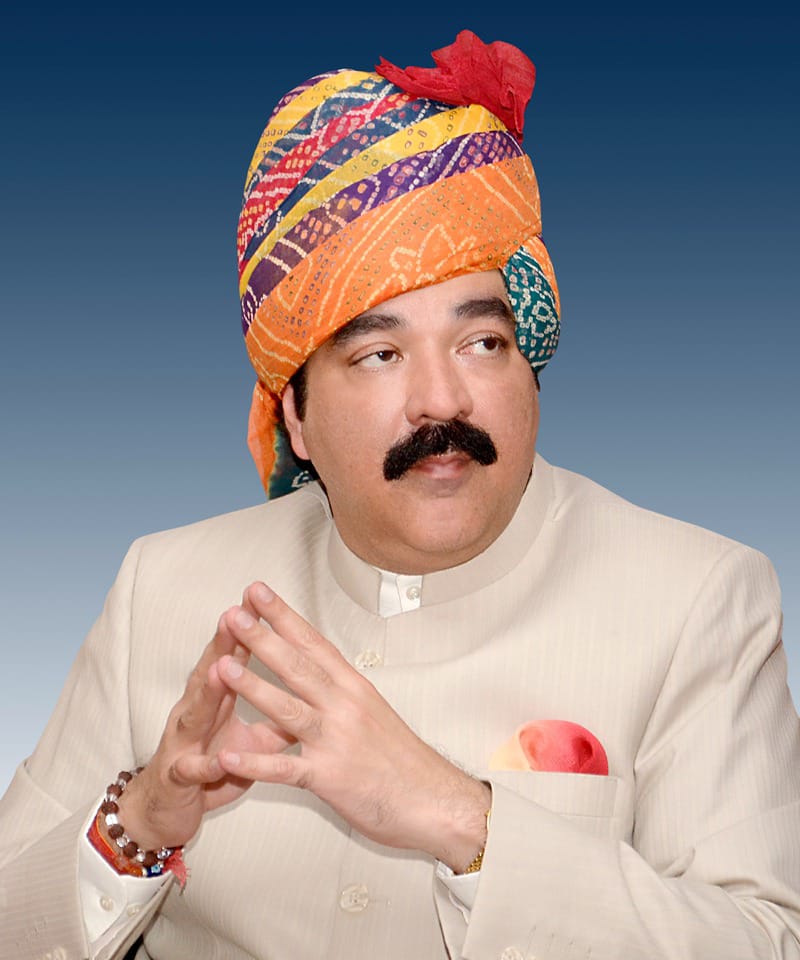
Birthday Greetings to M.K. Ajatshatru Singh Ji
MaharajaGulab SinghMemorial Trust and Research Centre conveys its respectful greetings and warm wishes to M.K. Ajatshatru Singh Ji on the joyous occasion of his birthday.
We sincerely wish you good health, long life, and continued success in all your endeavors. May the year ahead be filled with wisdom, strength, and fulfilment, and may your contributions continue to inspire society while upholding the highest values of service and leadership.
On this auspicious day, we offer our prayers for your well-being and future achievements, and extend our heartfelt regards and best wishes.
With utmost reverence
Staff of Maharaja Gulab Singh Memorial Trust and Maharaja Gulab Singh Research Centre
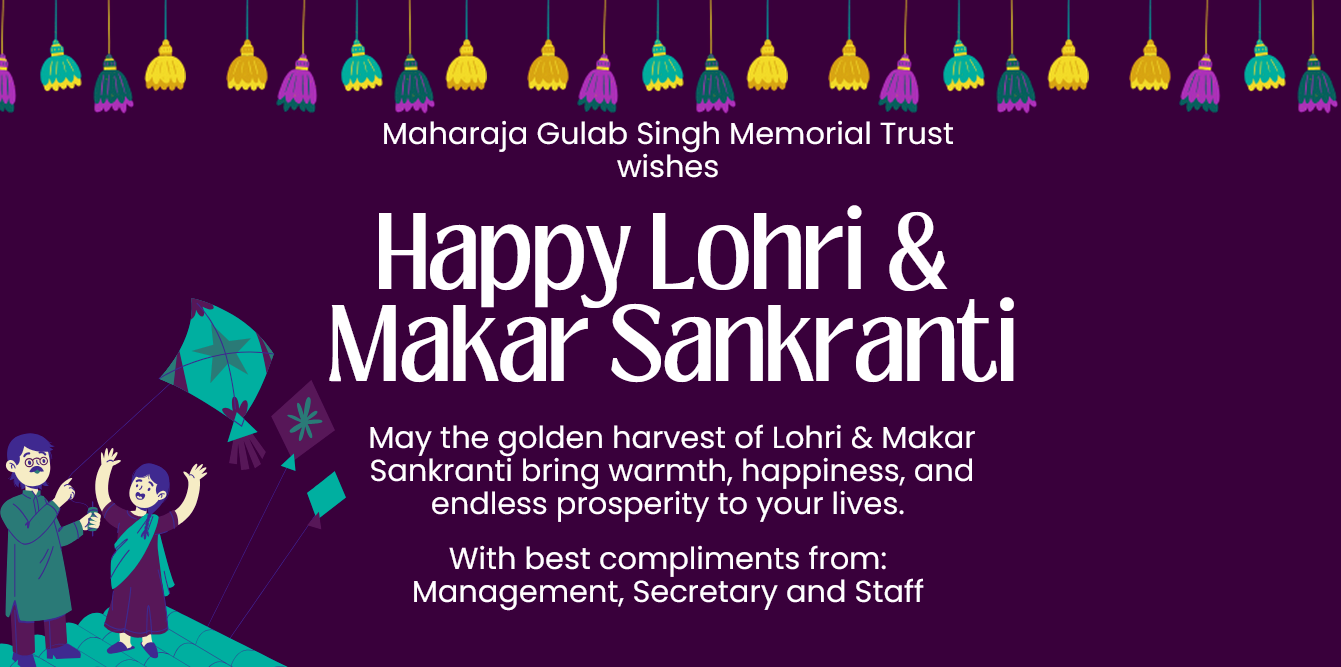
|
Nav Varsh Ki Hardik Shubh Kamnayain
to the people of Jammu & Kashmir
As we welcome the New Year, we extend our warm and heartfelt greetings and best wishes to you all. May the year ahead bring peace, good health and enduring success to you and your family.
We wish you and your families a very happy and prosperous New Year, 2026.
|
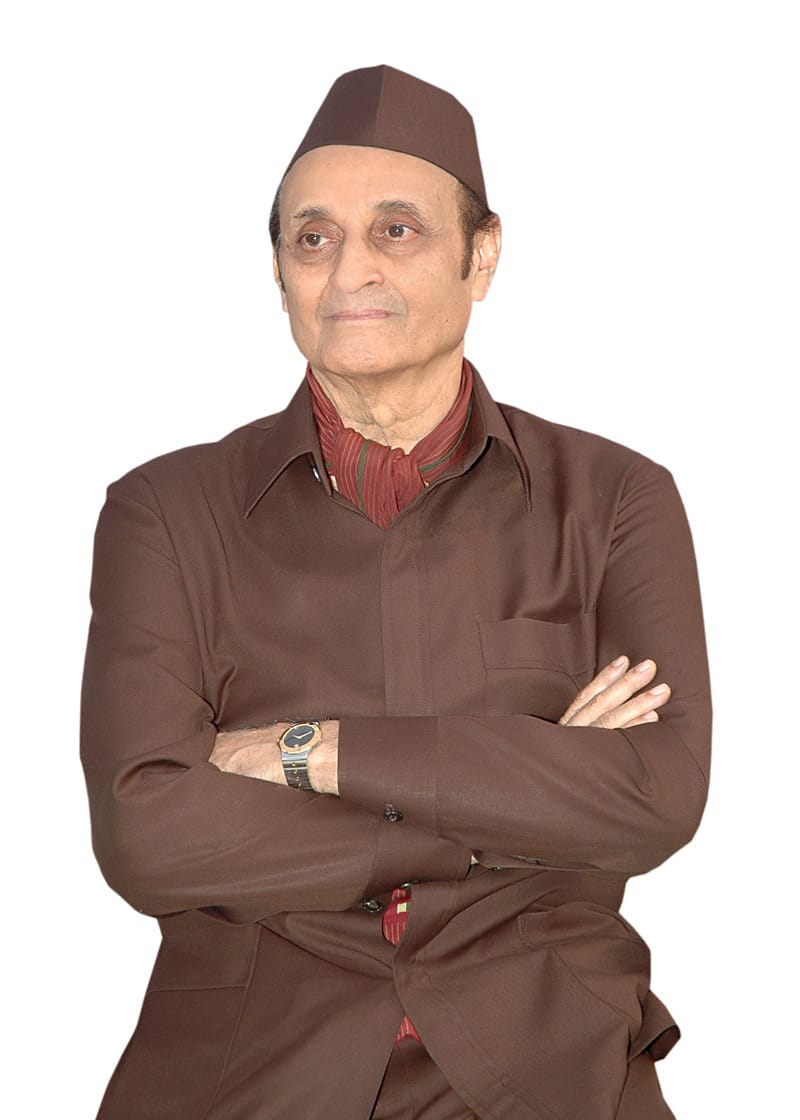 |
Dr. Karan Singh, Chairman Trustee |
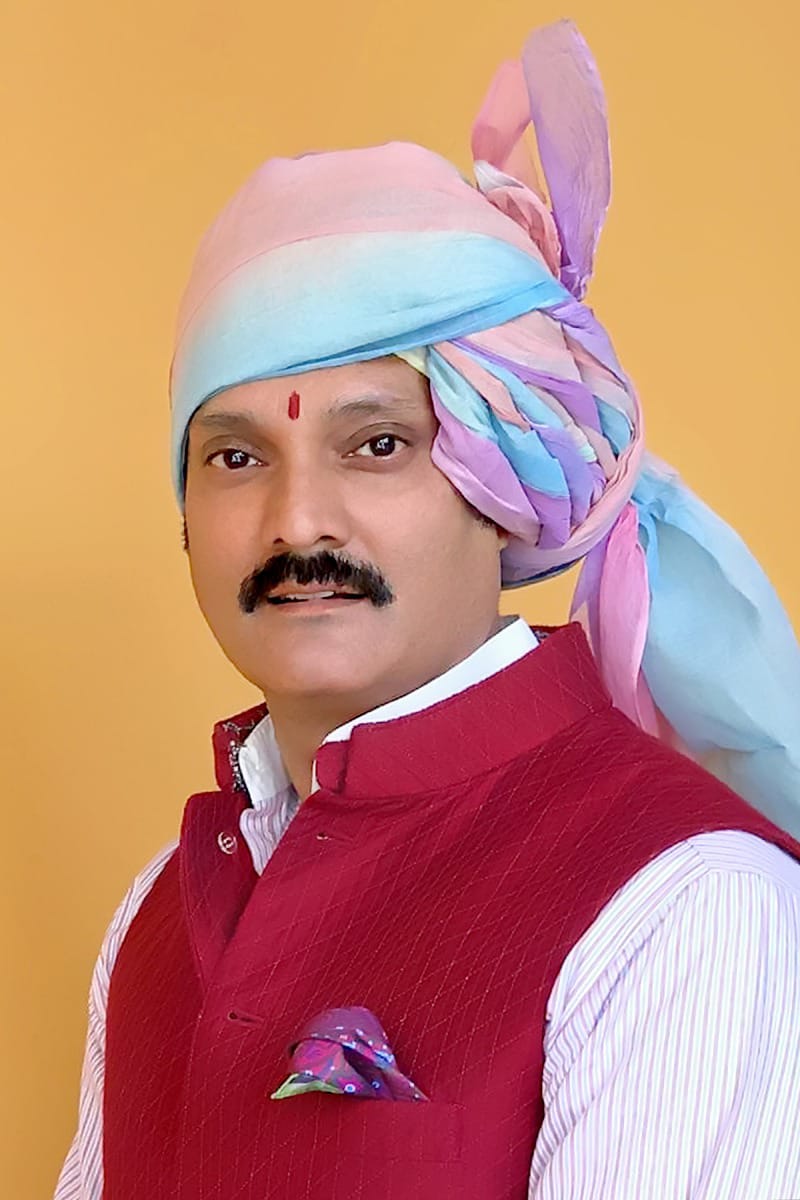 |
Yuvraj Vikramaditya Singh, Trustee |
 |
M.K. AjatshatruSingh, Trustee |
 |
R.K. Ranvijay Singh, Trustee |
|
The staff of Maharaja Gulab Singh Memorial Trust and Research Centre convey their sincere greetings and best wishes to Hon’ble Chairman Trustee and the Trustees on the auspicious occasion of the Happy New Year.
May the New Year bring you good health, peace and success in all your endeavors.
|
|
|
|
|
|
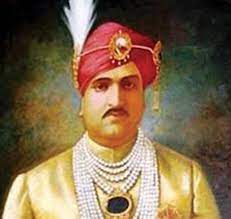
Respectful homage to the last ruler of J&K on his anniversary on 26th April
From the Trustees and Management of the Maharaja Gulab Singh Trust
|
|
|
|
|
|
|
|
|
|
|
Remembering Maharaja Pratap Singh on his Birth Anniversary
Maharaja Pratap Singh the third Dogra ruler of Jammu and Kashmir, was the longest-serving ruler among the Dogra emperors as he ruled for 40 years from 1885 to 1925. His time as an emperor is a period of modernization, peace, and enlightenment.
Maharaja Pratap Singh was born on July 18, 1848, in the Reasi district of J&K. His benevolence and kindness are seen as a benchmark, that no ruler after him could match.
Keeping in view the reforms carried by Maharaja Hari Singh one can clearly see that he was a progressive and a great reformer of his time.
Of the four Dogra rulers, Maharaja Pratap Singh’s era was a period of enlightenment for his subjects. He did a lot towards establishing local self-governing bodies, democratic processes, educational systems, health care & hygiene, and infrastructure development during his rule. By 1925, Kashmir, particularly Srinagar had undergone significant social and cultural transformation.
The state was least developed and there were not adequate means of communication with British India. A Cart Road was constructed during his reign to link Srinagar with Rawalpindi, the nearest rail-head in British India. Jhelum Valley cart road from Kohala to Baramulla was further extended to Srinagar in 1897. Another important highway, The Banihal Cart Road, was started in 1909 and was completed in 1922.
Efforts were made to popularise education. In pursuance of the suggestions made in the report of 1916, many changes were made in the system of education. Several new schools for both boys and girls were also opened. The imparting of education in the primary schools was made free.
One degree college each at Jammu (Prince of Wales College, established in 1907, and Srinagar (Sri Pratap College established in 1905). Amar Singh Technical Institute was established in Srinagar in 1914 and Sri Pratap Technical School was set up in Jammu in 1924 to meet the demands for higher education. By 1938, Sri Pratap College, with 1187 students on its rolls, achieved the distinction of being the second-largest college affiliated with Punjab University.
Tremendous efforts were made to provide health facilities.In 1889, two government hospitals were commissioned at Jammu and Srinagar, along with dispensaries across the villages and towns. Vaccination drives and preventative medicine were routine events. Municipalities were established in the populous towns of Jammu, Srinagar, Sopore, and Baramulla, to improve sanitation and hygiene. These initiatives went a long way in improving the health of the people. Smallpox used to take a very heavy toll on life in the valley. Large-scale vaccinations were administered in 1894 to prevent it.
For the prevention of floods in Srinagar a wide spill channel was constructed in 1904 which diverted the flood waters of Jhelum. Several irrigation canals were constructed in Jammu and Kashmir.
Maharaja Pratap Singh, born on 18 July 1848, took his last breath on 23 September 1925 at the age of 77 having ruled the longest and done a great deal for his subjects. Since he had no son of his own, his nephew Raja Hari Singh took over the throne on 24 September 1925.
|
Coronation of Maharaja Gulab Singh
(17th June 1822)
Maharaja Gulab Singh, the founder of the largest princely state known as the State of Jammu and Kashmir, was one of the greatest personalities of India in the 19th century. He was born on October 21, 1792 in a Dogra Rajput family at Anderwah near Samba in Jammu. His life history is a brilliant saga of a continuous chain of bravery, courage, chivalrous deeds, and glorious exploits which together changed the course of local as well as national history and geography. Gulab Singh, the most outstanding warrior of his time, was coronated as the Raja of Jammu by Maharaja of the Sikh Empire, the Sher-e-Punjab Maharaja Ranjit Singh. On June 17, 1822, Maharaja Ranjit Singh bestowed Gulab Singh the title of ‘Raja’. Maharaja Ranjit Singh personally applied the tilak on his forehead from top to bottom, which was symbolic of the long reign period of the Dogra rulers. The ceremony was performed at the historic Jeo-Pota tree on the bank of Chenab at Akhnoor fort.
|
|
|
128th Birth Anniversary of Maharaja Hari Singh
A Tribute
As we celebrate the Birth Anniversary of Maharaja Hari Singh Ji, we are reminded of his first public speech immediately after the coronation ceremony, where he declared that “If I am considered worth governing this State, then I will say that for me all communities, religions and races are equal. As ruler I have no religion, all religions are mine and my religion is Justice. It is possible that while dispensing justice I may commit mistake. To err is human. One who says that he does not commit a mistake is not speaking the truth. Only God is free from error. My duty is to look at one and all with equality. I shall, as far as possible, work with justice.”
His declaration was not just a symbolic gesture, or a matter of political expediency, once his agenda of reform started unfolding, it was clear that he meant every word of what he said and guided all his public acts and policy. In fact, his eleven points charter of declaration which consisted of ameliorative measure in the realm of education, medical facilities, supply of drinking water to kandi areas, freedom to the villagers to use the forest product all through the year and the changes in the transfer of the ownership of land were clear indications of his liberal outlook and the seriousness of his agenda of public welfare.
Keeping in view the reforms carried by Maharaja Hari Singh one can clearly see that he was a progressive and a great reformer of his time.
His speeches at the two Round Table Conferences in London were also historic moments in the history of Jammu and Kashmir and India. They showed his courage, wisdom and patriotism. He was a true nationalist and a visionary leader who wanted to see India as a free and united nation.
Celebration of his birth anniversary is a real tribute which Maharaja Hari Singh rightfully deserves.
Press release on 230th birth anniversary celebrations of Maharaja Gulab Singh
|
|
|
|
230th Birth Anniversary of
MAHARAJA GULAB SINGH
(October 21,1792)
Maharaja Gulab Singh, the founder of the largest princely state known as the State of Jammu and Kashmir, was one of the greatest personalities of India in the 19th century. He was born on October 21, 1792 in a Dogra Rajput family at Anderwah near Samba in Jammu. At the age of 16, he joined the Sikh army of Maharaja Ranjit Singh. He showed his mettle when Maharaja Ranjit Singh fought for the possession of Qila Attock in 1813. He led many successful campaigns for Maharaja Ranjit Singh like conquest of Jullander, Multan, Kashmir, Kishtwar.
For his meticulous and loyal services which he rendered for the solidarity, integrity and stability of the Sikh State, he received remarkable appreciation from Maharaja Ranjit Singh. On June 17, 1822, Maharaja Ranjit Singh bestowed Gulab Singh the title of ‘Raja’. Maharaja Ranjit Singh personally applied the tilak on his forehead from top to bottom, which was symbolic of the long reign period of the Dogra rulers. The ceremony was performed at the historic Jeo-Pota tree on the bank of Chenab at Akhnoor fort.
After consolidating his position in North, he launched expeditions towards East, which included Ladakh, Baltistan. His contemporaries described him as the "Ulysses of the Hills" and "Talley rand of the East".
On 16th March, 1846, Treaty of Amritsar was signed between Raja Gulab Singh and the representatives of Governor General of India, Lord Hardinge. By the virtue of this treaty, Raja Gulab Singh became the Maharaja of Jammu and Kashmir.
The founding of the new Princely State not only lent new geographical boundaries to our nation but also became the example of how regions having different historical trajectories can be wielded into one seamless political entity where diverse social and religious groups can exist in perfect harmony.

Fondly Remembering Maharaja Hari Singh on his Birth Anniversary
Maharaja Hari Singh, the fourth and last Dogra ruler of the erstwhile state of Jammu and Kashmir was born on 23rd September. He occupies an important place in the annals of the history of India in general and of Jammu and Kashmir in particular. When he ascended the throne on 23rd September, 1925, the state of Jammu and Kashmir was geographically one the largest princely state which included the Jammu Province, Jagirs of Poonch and Chenani, Province of Kashmir, and Frontier Provinces of Ladakh, Baltistan, and Gilgit. However, the Maharaja not only negotiated successfully these difficult situations but also took the state to the path of modernization by initiating several progressive and far-reaching social reforms. At the very first durbar of 1925, he had declared, “Justice is my religion.” He stuck to this secular vision in letter and spirit all his life. Within the short span of his rule, he abolished the Begar system (enforced labor) and threw open the gates of all temples to Harijans / Dalits way back in 1929. He then went on to introduce rules under which children were forced to receive modern education which came to be known as Jabri schools. Under this Jabar system, Muslim girls were made to attend school at a time when this was unknown elsewhere in India. Among other important reforms ushered by Hari Singh was his contribution to the making of modern India was well articulated in his speech that he made in 1930, at First Round Table Conference in London. He was at the forefront to suggest that the Indian Princely states would join an “All India Federation” and pleaded for equal status for Indians in the British Commonwealth of Nations.
In a historic decision after 75 years of Independence the Government, on 15th September, declared holiday on 23rd September, birth anniversary of Maharaja Hari Singh. Declaration of holiday will let Nation and Dogras celebrate and pay gratitude to the sacrifices of Maharaja Hari Singh, an everlasting tribute to the man who was a great educationist, social reformer, progressive thinker and above all a modest person.
|
|
|
|
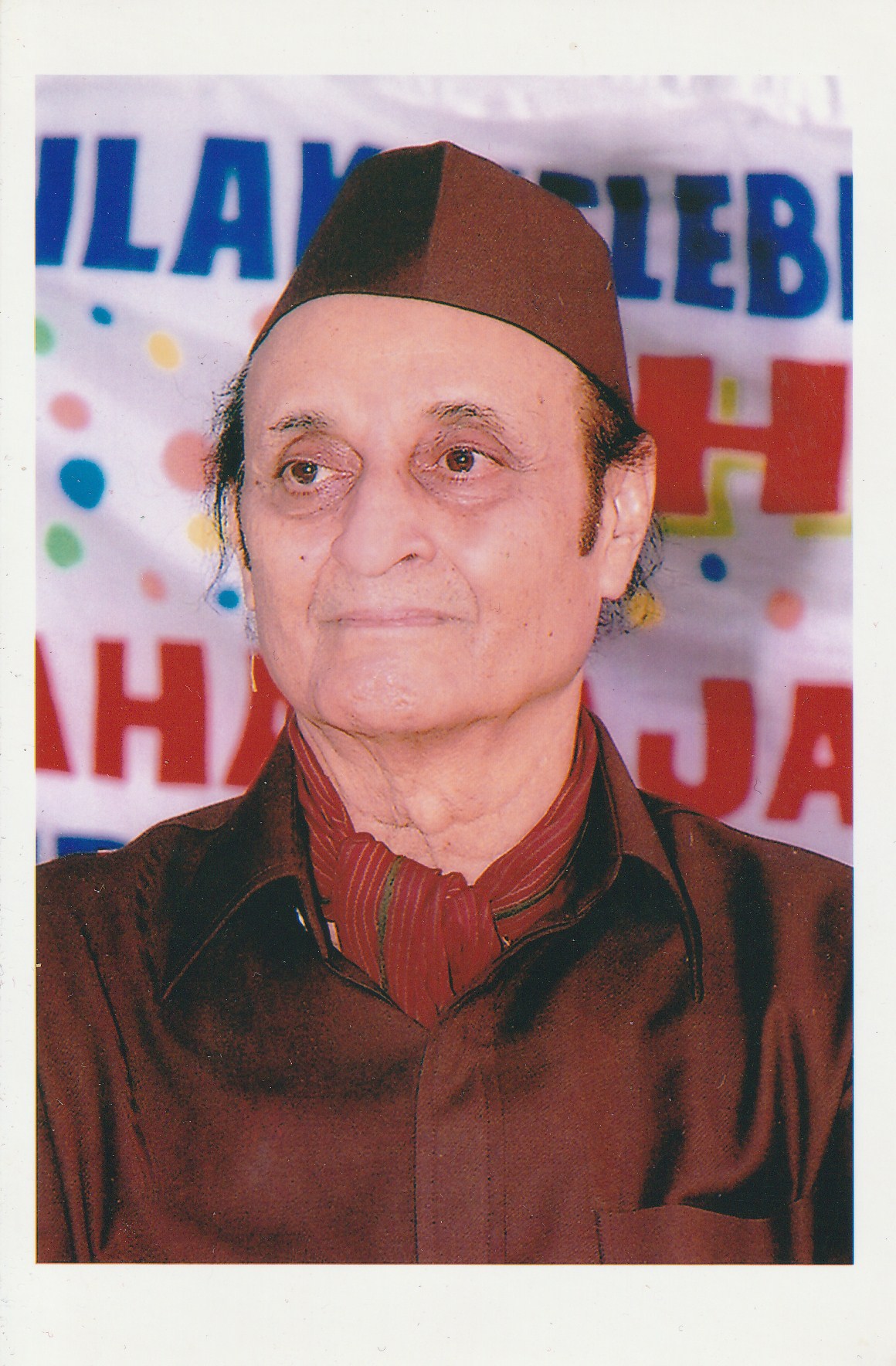
MAHARAJA GULAB SINGH MEMORIAL TRUST WISHES DR. KARAN SINGH JI (CHAIRMAN TRUSTEE, MAHARAJA GULAB SINGH MEMORIAL TRUST) A VERY HAPPY BIRTHDAY ON HIS 91ST BIRTHDAY
We all wish Dr. Karan Singh ji a healthy and prosperous life. May God bless him with many more years of good health and happiness. He has been a source of inspiration for all of us.
Maharaja Karan Singh, a distinguished Indian politician, philanthropist and the scholar of international repute, was born on 9 March 1931, as heir apparent to the last ruler of the state of Jammu and Kashmir, Maharaja Hari Singh. Having worked with the great leaders such as Jawaharlal Nehru and Sardar Vallabhbhai Patel, he went on to serve successively as regent, Sadr-e-Riyasat and governor of the state. Dr Singh was the youngest Cabinet Minister when he joined the Union Government in 1967. He has held the tourism and civil aviation, health and family planning, education and culture portfolios in the Indian government. He also served briefly as Ambassador to the United States. Dr Singh has been the Chancellor of Banaras Hindu University, Jammu and Kashmir University, and Jawaharlal Nehru University. He has also served as the Chairman of the Indian Board of Wildlife and is associated with several cultural and academic institutions. In 2005, Dr Karan Singh was conferred the Padma Vibhushan, the second highest civilian award in India.
We all once again wish him happy birthday and healthy, prosperous and long life. |
Maharaja Gulab Singh Research Centre invites research papers on Maharaja Ranbir Singh for two days National Seminar scheduled to be held on 10th - 11th March, 2022.
click on this link to know the details
|
|
229th Birth Anniversary of Maharaja Gulab Singh Ji
(1792 to 1858)
Maharaja Gulab Singh, the founder of the largest princely state known as the State of Jammu and Kashmir, was arguably one of the greatest personalities of India in the 19th century. He was an exceptional warrior, great leader and brilliant strategies and statesman and most importantly, the architect of syncretic cultural space in multi-religious state. The history of his life and contributions that he made in the realm of society, polity and economy of India in general and of Jammu and Kashmir in particular, is truly fascinating and inspirational. Maharaja Gulab Singh had extended all the way from the foothills of Jammu to Gilgit and Baltistan bordering on central Asia and Ladakh bordering to Tibet.
On this occasion Maharaja Gulab Singh Research centre is releasing the book “Life and Legacy of Maharaja Hari Singh”. |
|
WEB LECTURE ON “MAHARAJA HARI SINGH AND HIS CONTRIBUTION TO INDIAN HISTORY”
Maharaja Gulab Singh Research Centre organized a Web lecture in collaboration with the Department of History, University of Jammu on Thursday, 23rd September, 2021.
The lecture started at 12.30 pm with the introductory remarks by Prof. Suman Jamwal, Head, Department of History, University of Jammu, who also welcomed the speaker of the day Prof. Kuldeep Chand Agnihotri. He is the former Vice Chancellor of the HP University Dharamshala. He has nearly 15 publications to his credit out of which some are devoted to the history of Jammu and Kashmir such as “Jammu Kashmir ke Jan-Nayak, Maharaja Hari Singh”. The Lecture was held to commemorate the birth anniversary of Maharaja Hari Singh. The title of his presentation was “Maharaja Hari Singh and his contribution to Indian history”. The focus of the speaker was to present in proper historical perspective, the imagery of Maharaja Hari Singh and his role in the accession of the largest princely state of Jammu and Kashmir to the Indian Union.
The presentation was followed by an interactive session in which many questions were raised by the participants, these all were addressed by the speaker.
The lecture was attended by the members of the academic fraternity of the University of Jammu, Research scholars, students and the members of civil society. The lecture was moderated by Prof. Shyam Narayan Lal.
The programme concluded with the vote of thanks by Dr Sushma Jamwal, Research Consultant of Maharaja Gulab Singh Research Centre.
|

Birth anniversary of Maharaja Hari Singh (23 September 1895)
Maharaja Hari Singh was the fourth and the last Dogra monarch of the state. He was born on 23 September A.D. 1895. He became the Maharaja of Jammu and Kashmir on 23 September 1925. At the very first Durbar of 1925, he declared, “Justice is my religion”. He was a great reformer and progressive thinker; he stuck to this secular vision in letter and spirit all his life.
He set up a responsible government with full provincial autonomy and a Board of Judicial Advisors with the ruler as the constitutional head. The finances of the State were governed on modern principles. He abolished the begar system and threw open the gates of all temples to Harijans. He promoted diverse cultural activities of the state. The sea of reforms and people friendly policies which he initiated endeared him to all his subjects, irrespective of class, religion and gender.
His contributions to the state are many but his commitment to India even as a ruler of a vast independent Princely state even more noteworthy and inspiring. He was the first amongst 560 rulers, who supported the cause of India’s Independence at the Round Table Conference in the House of Lords in London in 1931. Maharaja Hari Singh breathed his last at Bombay on 26 April, 1961.
|
|
Maharaja Gulab Singh Memorial Trust condoles the death of
Mother of Dogri literature PadmaShri Padma Sachdev
Famous Dogri Poetess Padma Sachdevji left for heavenly abode today on 04-08-2021. Padma Sachdev, an outstanding and versatile writer in Dogri and Hindi, was born on April 17, 1940 at Jammu. She has been honoured nationally and internationally for her literary contributions. She was honoured with Padma Shri in 2001. In 2007, she was awarded Maharaja Gulab Singh award. She was a legendary poetess who took the Dogri literature to the world platform and gave recognition to the Dogri culture. It is a great loss to the Dogri literature. Her immense contribution to the Dogra culture shall be remembered for generations. May God bestow peace to the departed soul.
|
 
Remembering Maharaja Gulab Singh on 200th Raj Tilak Divas on 17-06-2021
Maharaja Gulab Singh, the founder of the largest princely state known as the State of Jammu and Kashmir, was arguably one of the greatest personalities of Indian in the 19th century. He was an exceptional warrior, great leader and brilliant strategist and a statesman, and most importantly, the architect of syncretic cultural space in multi-religious state. The history of his life and the contributions that he made in the realm of society polity and economy of India in general and of Jammu and Kashmir in particular, is truly fascinating and inspirational.
Born in a family of modest resources, Maharaja did not have those comforts and resources in his early life usually associated with royalty. The blood of Raghuvanshi clan, however, flowed in his veins through his paternal side. Thus he had hereditary claims to valor and military distinction which started manifesting itself quite early,along with his gifted ability to transcendent the apparent difficulties of his position, time and space. This young, handsome and dashing Maharaja chose to follow the tough and strict regimentation of a soldier's life and at the mere age of sixteen distinguished himself in the defense of Jammu against a force dispatched by Maharaja Ranjit Singh.
This was just the beginning of realization of a larger imperial dream which Maharaja nurtured deep in his heart. A hardcore realist, he well understood the political landscape of his time and, decided to try his fortune outside Jammu. This brought him to the famous Lahore Durbar. Since the story of about his bravery, diplomatic skill, strategic understanding and worldly wisdom had reached the Lahore Durbar ahead of him; he had no difficulty in finding a place in the Sikh army. Within a few years of his recruitment, he led many successful campaigns for his master and played a key role in the consolidation and the management of Lahore state which earned him the position of a Jagirdar. Apart from rise in the rank, he also rose in the esteem of Maharaja Ranjit Singh who constantly started seeking the benefit of his advice on matter of strategic importance and statecraft. He soon became an ‘irreplaceable jewel’ in the crown of the Lahore Darbar’. Thus by 1821, Gulab Singh’s authority came to be established over a vast area in the Jammu region
Raj-Tilak of Maharaja Gulab Singh
For his meticulous and loyal services which Gulab Singh rendered for the solidarity, integrity and the stability of the Sikh state, he received remarkable appreciation by Maharaja Ranjit Singh. On June 17, 1822 Maharaja Ranjit Singh bestowed Gulab Singh the title of ‘Raja’. Maharaja Ranjit Singh personally applied the tilak on his forehead from top to bottom, which was symbolic of the long reign period of the Dogra rulers. The ceremony was performed at the historic JiaPota tree on the bank of Chenab at Akhnoor fort.
|
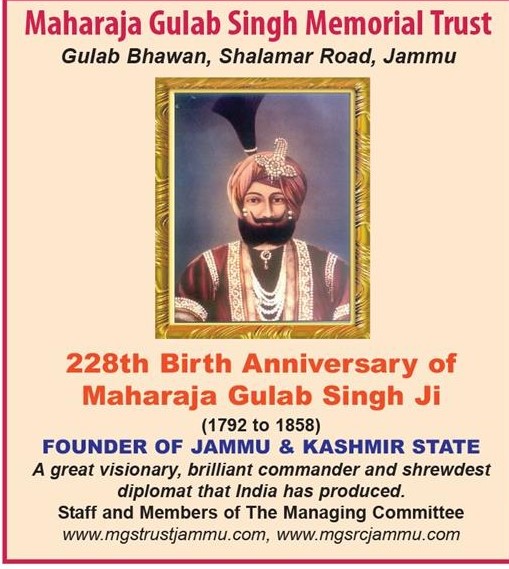
On the occasion of 228th birth anniversary of Maharaja Gulab Singh, Maharaja Gulab Singh Research Centre on Wednesday 21st October 2020 organized a Web lecture.
The lecture started with the welcome note by Prof. Suman Jamwal. Dr. Sushma J Barnawal, Research Consultant, Maharaja Gulab Singh Research Centre presented the list of academic endeavors undertaken by the Centre. Brigadier J. S. Rajput (Retd.), member secretary, dwelt upon the aims and the agenda of the research centre and how Maharaja Gulab Singh Trust has played an active role in its creation.
Dr. Karan Singh, Chairman Trustee, presided over the lecture. In his presidential remarks, he underlined the necessity of revisiting the life and time of Maharaja Gulab Singh, the founder of royal Dogra dynasty and first Maharaja of the princely state of Jammu and Kashmir, the second largest princely state in British state. In this context Dr. Karan Singh also spoke about how the existing historiography has not given the place that he deserves in history. He particularly emphasized his role in Ladakh and the nature of relationship that he developed with peripheral areas of Hunza, Chitral etc.
Shri Harbans Singh, an eminent scholar was the key speaker of the web lecture. He started with the early life of Maharaja Gulab Singh and traced the process through which he acquired the status of Maharaja. The speaker also highlighted the Trans Himalayan conquests which pushed the boundaries of India into Tibet and Xinjiang.
The programme was hosted by Prof. Shyam Narayan Lal, Head of the Dept. of History, Jammu University. Prof. Lal stressed on the role of Gulab Singh not just as a ruler but his contribution in creating a conducive atmosphere for literary and cultural activities in the region.
The Web lecture was attended by the members of the academics of the University of Jammu, Research scholars, and students, members of civil society, prominent among them being Maj. General Govardhan Singh Jamwal (Retd), Sh. Gulchain Singh Charak, Shri Mubarak Singh, Dr. Ved Kumari, Shri Ajay Gandotra and Manu Khajuria of “Voice of Dogra”.
Click here to view the Press Release
|
(Click to read full screen)
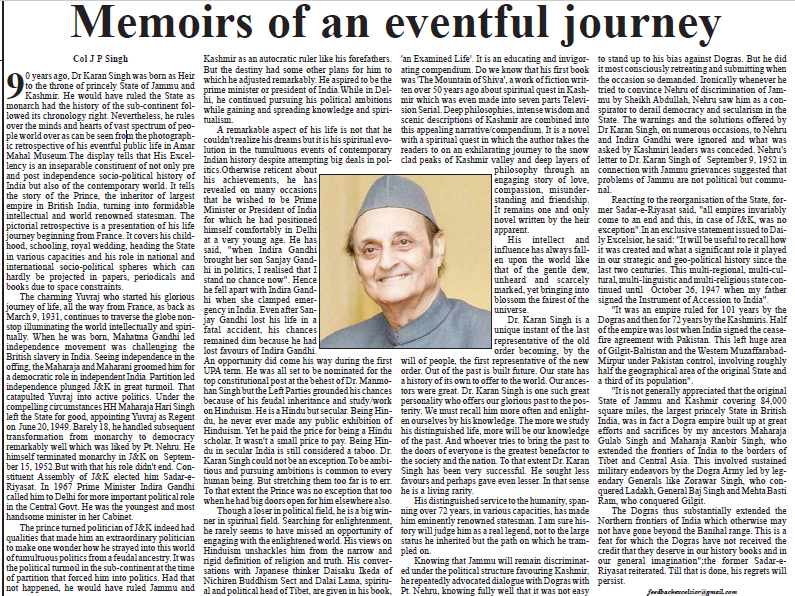 |
|
|
Birthday of Maharaja Hari Singh, the last ruler of Jammu and Kashmir, is being celebrated by the Youth Rajput Sabha at the Samark of Maharaja Hari Singh, at Main Tawi Bridge.
|
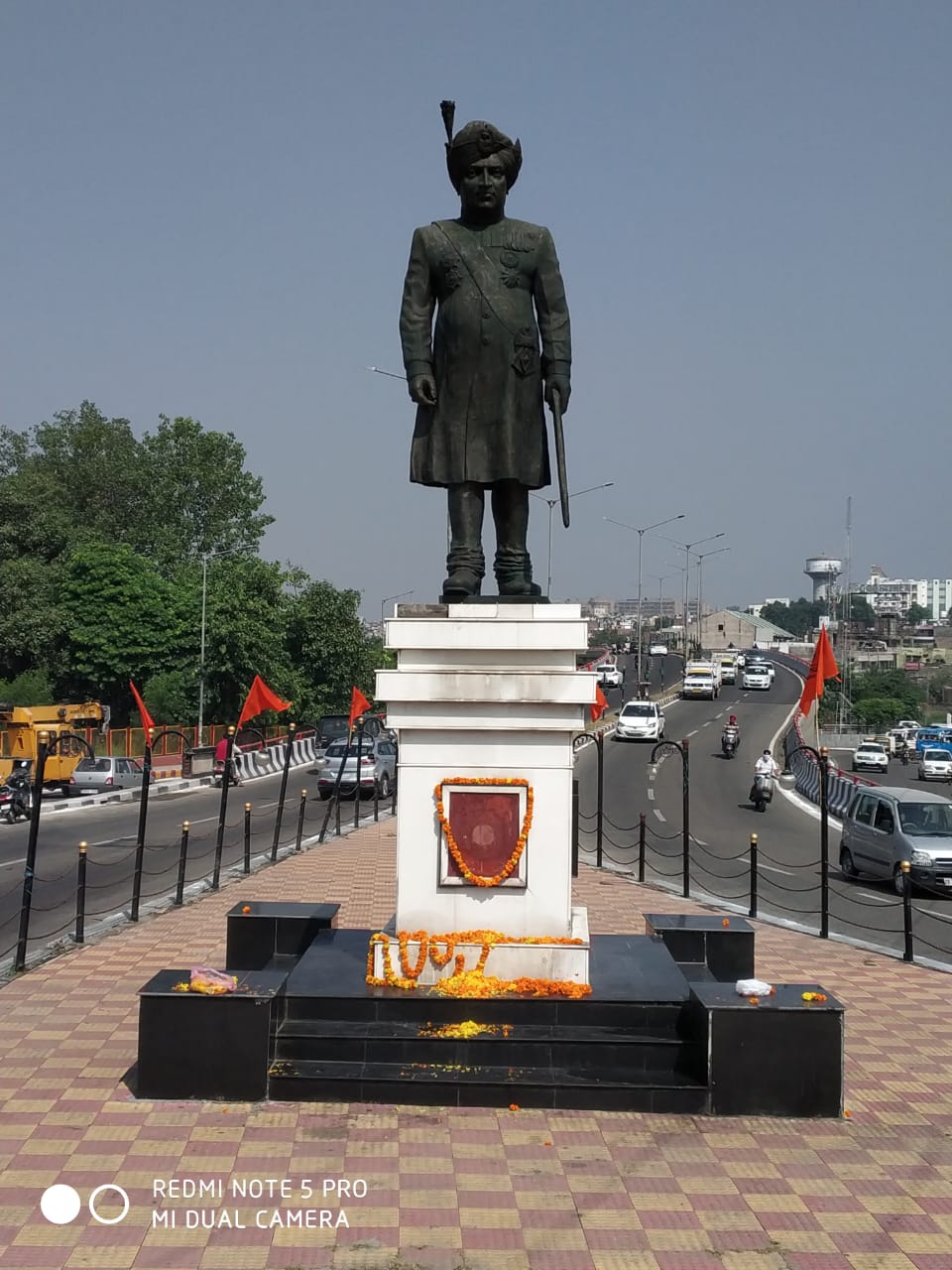
Maharaja Hari Singh was born on 23rd September 1895, in Amar Mahal. He was the fourth and last Dogra ruler of princely state of Jammu and Kashmir.
Maharaja Hari Singh ascended the throne after the death of his uncle Maharaja Pratap Singh on September 23, 1925. After the coronation ceremony, Maharaja Hari Singh in his first public speech, he declared “If I am considered worth governing this State, then I will say that for me all communities, religions and races are equal. As ruler I have no religion, all religions are mine and my religion is Justice. It is possible that while dispensing justice I may commit mistake. To err is human. One who says that he does not commit a mistake is not speaking the truth. Only God is free from error. My duty is to look at one and all with equality. I shall, as far as possible, work with justice.”
Maharaja Hari Singh was a Hindu King who ruled over a Muslim majority State. He did not discriminate between his Hindu and Muslim subjects. He gave importance to the meritocracy and appointed the best of Muslims in his court.
It is a fact, that the period from 1925 to 1947 witnessed a series of revolutionary changes in the socio-religious and cultural life of the people of this region. Women also did not remain untouched, as far as social reforms undertaken by Maharaja Hari Singh.
Maharaja Hari Singh was an enlightened ruler, who was fully aware of the impact of several socio-religious evils and rigid customs of the society which were mainly woven for the women and which deprived women from many rights. Women were mostly identified with silence, deprivations and marginalization and were considered as the weaker or second sex.
Maharaja Hari Singh took many initiatives to elevate the standard of women during his reign. Measures were taken to remove the social evils prevailing in the society like, prostitution, sati, child marriage, female infanticide, widow-remarriage, buying and selling of females within and outside the State. Beside this he, undertook many measures to improve the education system prevailing in the State with special focus on weaker sections which included women also.
Hence the period of Maharaja Hari Singh rule, is ushered as the period of progressive era
|
|
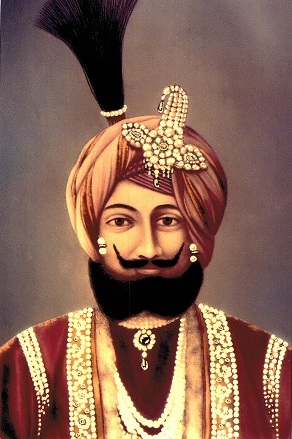 |
|
The Maharaja Gulab Singh Memorial Trust was set up by Dr. Karan Singh and Maharani Yasho Rajya Lakshmi in 1959.
Maharaja Gulab Singh, the founder of the largest princely state of Jammu and Kashmir was arguably one of the greatest personalities of the 19th century. He became the ruler of modern J & K state in 1846. He was an exceptional warrior, great leader, a brilliant strategist and statesman, and most importantly, the architect of synergetic cultural space in multi-religious state. The history of his life and the contributions that he made in the different realms of Jammu and Kashmir in general and towards restructuring the map of India that we have today in particular has been inspirational.
|
|
|
|
|
| |
| Activities |
| |
|
|
|
| |
One of the major activity of the trust is to celebrate the birth anniversary of Maharaja Gulab Singh, the founder of the modern state of Jammu and Kashmir.
The trust awards "Maharaja Gulab Singh Award". This award is given to distinguished person from the State who has excelled in one's field of performance and has gained national and international recognition.
"Maharaja Ranbir Singh Scholarships" – The trust has instituted two scholarships in the name of Maharaja Ranbir Singh every year to the students from the state.
"Maharaja Gulab Singh Research Centre" - It was formally inaugurated by Dr. Karan Singh, on 20th October 2017. The centre has been established in order to advance, stimulate and encourage learning and research in the history and culture of the Jammu region.
|
| |
|
|
|
|
|
|
|
|
